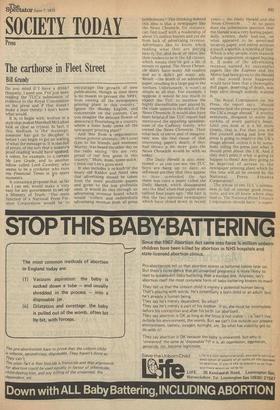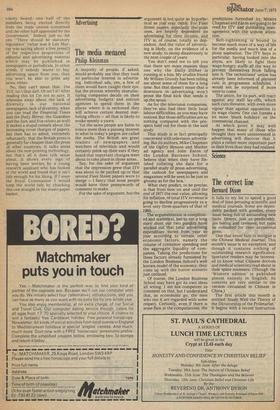Press
Thecarthorse in Fleet Street
Bill Grundy
Do you mind if I have a drink? Honestly, I need one. I've just been reading the TUC's submission of evidence to the Royal Commission on the press and if that doesn't make a man thirsty, I don't know what would.
It is, to begin with, written in a style that makes Marshall McLuhan look as clear as crystal. In fact, if this medium is the message, someone has got to decipher it before I can begin to get an inkling of what the message is. It is also full of errors, of the sort that a minute's proof-reading would have spotted: it refers, for example, to a certain Mr Lew Grade, and to another fellow called Lord Cowdrey who seems to be a cricketer who runs the Financial Times in is spare moments.
It contains a proposal that, as far as I can see, would make it very easy for any government to set up a Ministry of Truth: "The main function of a National Press Finance Corporation would be to encourage the growth of new publications, though in time there is no reason to prevent the NPFC from owning all the newspapers printing plant in this country." Ignore the shoddy English, and concentrate on the content. Can you imagine the delicate flower of democracy flourishing in a country where a state body owns all the newspaper printing plant?
And this from a organisation whose general secretary, Mr Lionel (Len to his friends and enemies) Murray, was heard the other day on the radio saying -We are very proud of our free press in this country." Mum, mum, come quick; I think our Len's gone mad.
It also includes a re-hash of the hoary old Kaldor and Neild idea that advertising should be taken from the more profitable papers and given to the less profitable ones. It would do this through an advertising revenue board which would "collect and redistribute advertising revenue from all press
publications." The thinking behind this idea is that a newspaper like the News Chronicle, for instance, can find itself with a readership of about 11/2 million buyers and yet die from lack of advertising revenue. Advertisers like to know who's reading what they are paying heavily for, and most of them like their readers to be in the AB classes, which means they've got a bit of money to spend. The News Chronicle didn't have many AB readers and so it didn't get many ads. Result —the death of an admirable paper, resulting in a large gap in the medium. Unfortunately. it wasn't as simple as all that. For example, I suppose it would be too much to expect the TUC to mention the highly discreditable part played by the trade unions in the death of the News Chronicle. It would also have been helpful if the TUC report had mentioned the appalling spinelessness of the Cadbury family, who owned the News Chronicle. Their total lack of nerve and of imagination was the real cause of that interesting paper's death; if they had shown a bit more guts the News Chronicle would be with us today.
The Daily Herald is also mentioned — as you can see, the TUC boys are bang up to date; so informed are they that they appear to have overlooked the fact there was once a paper called the Daily Sketch, which disappeared into the Mail when that paper went tabloid four years.ago: -the fact is that the two national newspapers which have closed down in recent years — the Daily Herald and the News Chronicle . . ." At no point does the submission mention that the Herald was a very boring paper, dully written, dully laid-out, on what appeared to be sensitised lavatory paper, and edited without a touch a sparkle, a scintilla of flair. Which is why people, even staunch Labour supporters, stopped buying it. If some of the advertising revenue earned by successful papers like the Express and the Mirror had been given to the Herald all that would have happened would have been that a thoroughly dull paper, deserving of death, was kept alive though nobody wanted it.
The Royal Commission on the Press, the report says, "should examine how the press can improve the UK's image abroad," A worthy sentiment, designed to warm the cockles of every patriot's heart. Until you look at it a bit more cIosely, that is. For then you will firid yourself asking just how the press is going to improve the UK's image abroad, unless it is by somebody telling the press just what it should print about the UK. And if they don't print it what is going to happen to them? Are they going to be deprived of access to the newspaper printing plant which by this time will all be owned by the National Press Finance Corporation?
The whole of the TUC's submission is full of similar good intentions, .and we all know where they lead to. The National Press Finance Corporation should have "a super
visory board, one half of the members being elected directly from the trade unions concerned and ihe other half appointed by the Government." Indeed, just so. Ah yes. "There should be statutory regulation" (what was it Len Murray was saying about a free press?) of the respective proportions of editorial and advertising material which may be published in newspapers or periodicals. In other words, if nobody wants to buy advertising space from you, then you won't be able to print any news, either.
No, they can't mean that. The TUC isn't that daft. Or isn't it? After reading this lot I'm not so sure. It whinnies away about the lack of diversity in our national newspapers; lack of diversity, when you can read the Financial Times and the Daily Mirror, the Guardian and the Sun, and five others as well! It makes a stupid remark about the increasing cover charges of papers, but then has to admit, extremely reluctantly, that the British press is generally far cheaper than the press of other countries. It talks sense about the new printing technology, but that's all it does talk sense about. It shows every sign of having been written by a young research assistant who has looked at the world and found that it isn't tidy enough for his liking. If 1 were the Royal Commission I would keep the world tidy by chucking this one straight in the waste paper basket.



































 Previous page
Previous page